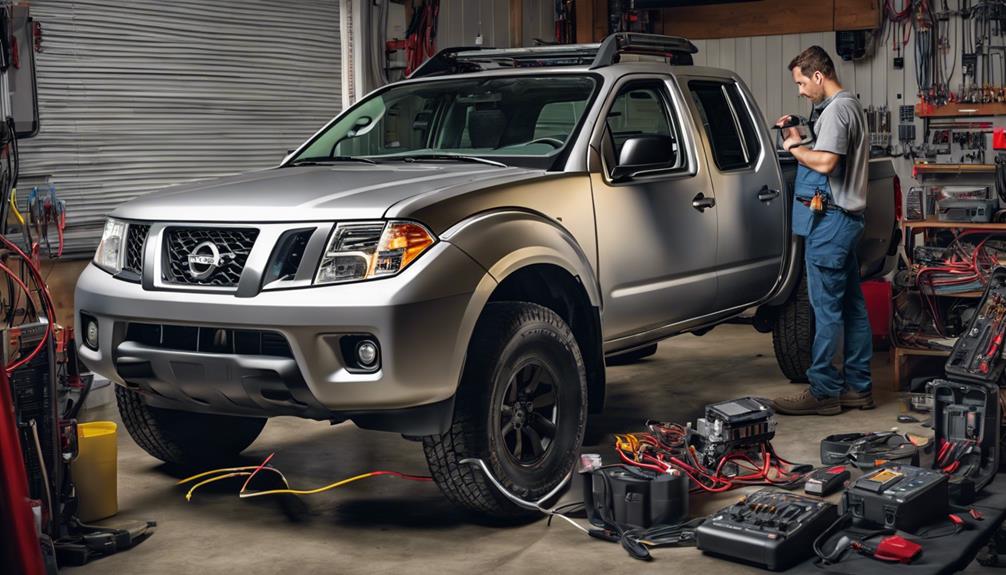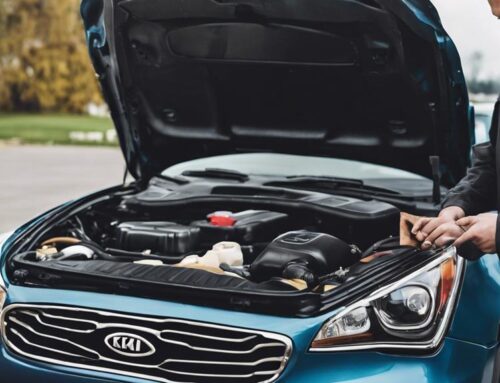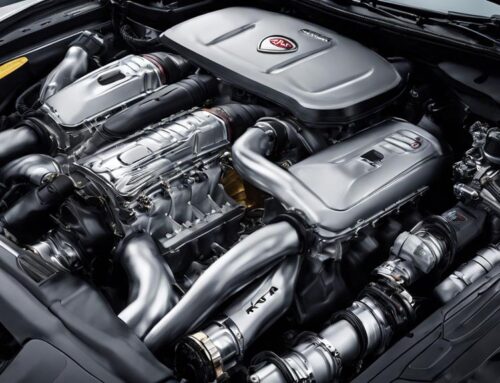Common electrical issues in the Nissan Frontier include problems with the battery, alternator, fuses, and relays. You may experience intermittent starting, dimming headlights, or issues with the keyless entry system. Blown fuses, damaged wiring, and faulty voltage regulators can also affect performance. Use diagnostic tools like OBD-II scanners to identify problems accurately. Routine maintenance, including voltage checks and fuse inspections, can prevent most issues. Pay attention to dashboard warning lights for early signs of trouble. If you're ready to tackle these problems efficiently, there are additional specifics that will guide you further.
Key Takeaways
- Regularly check for blown fuses, corrosion, or loose connections in the fuse box.
- Inspect for wear, fraying, or damage in vehicle wiring to ensure consistent electrical flow.
- Verify the correct functioning of the voltage regulator to prevent power surges.
- Use diagnostic tools to quickly identify and rectify wiring and fuse problems.
- Proactive maintenance ensures vehicle dependability and optimal performance.
Overview of Electrical Issues
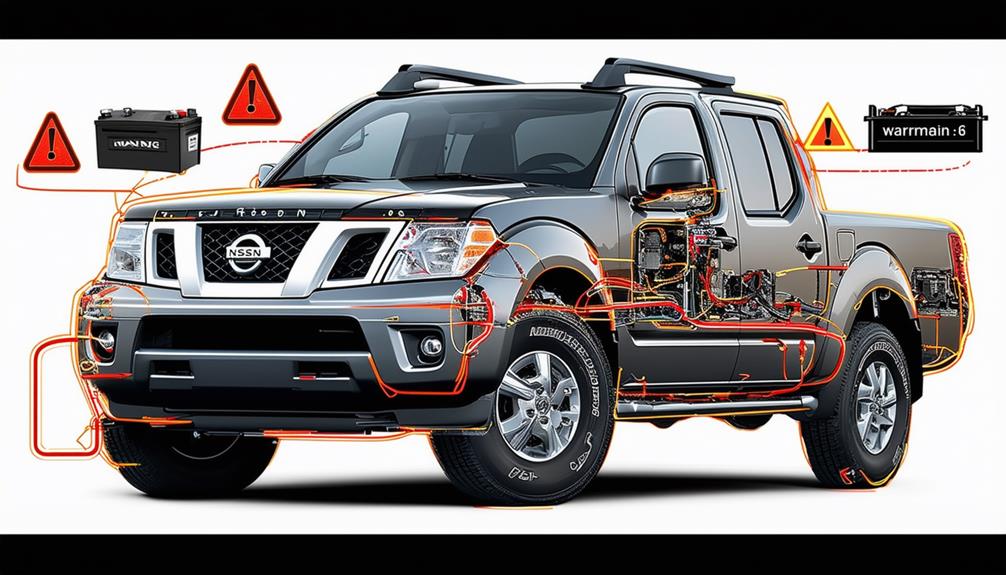
When you own a Nissan Frontier, understanding the electrical issues that can arise is vital for maintaining peak performance. Electrical components in your vehicle are intricate and interconnected, making it necessary to be aware of potential problems and how to address them efficiently. For example, regular maintenance and key system care play a significant role in preventing electrical issues from affecting your vehicle's ignition system.
First, you'll need reliable diagnostic tools. These instruments allow you to pinpoint issues within your Frontier's electrical system accurately. From the battery and alternator to the complex network of sensors and wiring, diagnostic tools help you identify faults quickly, making sure you can tackle the root cause without unnecessary guesswork.
Innovative tools like OBD-II scanners can interface directly with your vehicle's onboard computer, providing real-time data and error codes that are invaluable for troubleshooting.
Common electrical components that may experience issues include the battery, alternator, fuses, and relays. The battery is the heart of your Frontier's electrical system, providing the necessary power to start the engine and run various accessories. A weak or failing battery can cause starting issues and erratic electrical behavior.
The alternator, on the other hand, ensures the battery remains charged and powers electrical systems while the engine is running. A malfunctioning alternator can lead to dimming lights and a dead battery.
Fuses and relays act as protectors for your vehicle's electrical circuits. When one of these components fails, it can cause specific systems, like the headlights or radio, to stop working. Regular inspection and testing of these parts can prevent minor issues from escalating into more significant problems.
Common Ignition Problems
Ignition problems in your Nissan Frontier can be particularly frustrating and disrupt your daily routine. When your vehicle experiences starting problems, it can stem from several issues—often related to the ignition switch. Understanding these common ignition problems can help you address them promptly and efficiently.
One frequent issue is a faulty ignition switch. The ignition switch plays a vital role as it sends the electrical signal to start your engine. If this component malfunctions, you may encounter intermittent starting problems or total failure to start. Additionally, worn-out keys or damaged tumblers within the ignition cylinder can also cause starting issues.
Here's a quick comparison of common ignition problems and their symptoms:
| Problem | Symptoms |
|---|---|
| Faulty Ignition Switch | Intermittent or no starting, stalling |
| Worn-out Key | Difficulty turning key, no start |
| Damaged Ignition Cylinder | Key gets stuck, no engine response |
Another aspect to keep in mind is the ignition relay. This component works in tandem with the ignition switch, and if it fails, the electrical pathway is disrupted, preventing your Frontier from starting. Pay attention to electrical accessories such as lights and radio; if they don't function when you turn the key, the relay might be the culprit.
Innovative solutions like keyless entry systems have also added complexity to ignition problems. While these systems offer convenience, they can fail due to software glitches or signal interference, further complicating the diagnosis.
Battery and Charging System Issues
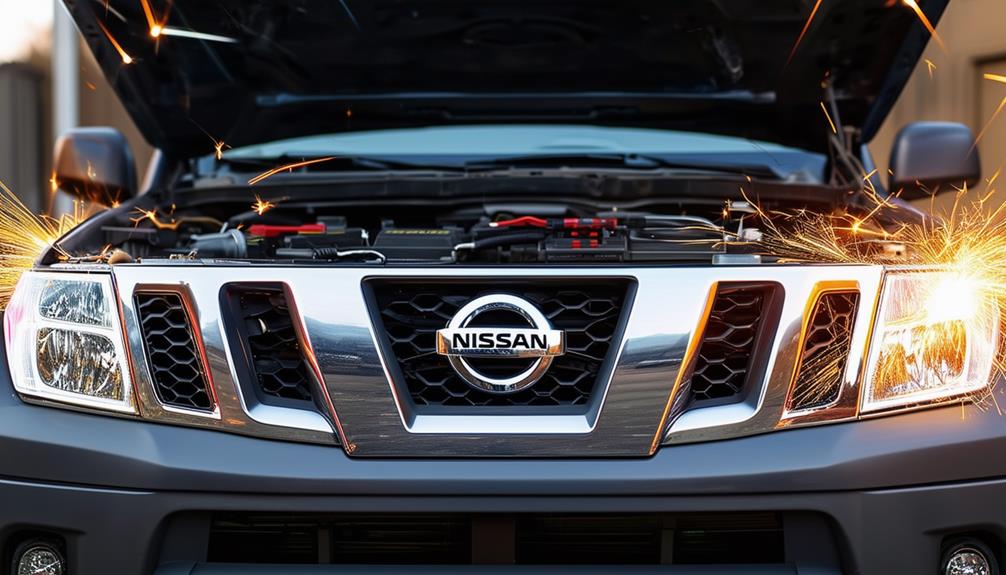
Although ignition issues can be a major headache, don't overlook the battery and charging system in your Nissan Frontier. These components are critical for reliable vehicle operation and can present a variety of problems if not properly maintained. Understanding the intricacies of your Frontier's battery and charging system can help you proactively address potential issues and keep your vehicle running smoothly. It's also beneficial to be aware of additional services offered by experts like Low Rate Locksmith, which can assist in maintaining your vehicle's electrical components.
One common issue is battery drain, which can leave you stranded with a vehicle that won't start. This often happens due to parasitic electrical loads, like a malfunctioning interior light or an aftermarket accessory that draws power even when the engine is off. Regularly checking your battery voltage and disconnecting unnecessary accessories can mitigate this problem.
Another key component is the alternator, which is responsible for charging the battery while the engine is running. A failing alternator can lead to a depleted battery and various electrical issues. Signs of a failing alternator include dimming headlights, flickering dashboard lights, and unusual noises. If you notice these symptoms, an alternator replacement might be necessary to prevent further complications.
Here are some steps to ensure your battery and charging system are functioning efficiently:
- Routine Maintenance: Regularly inspect the battery terminals for corrosion and ensure they're securely connected.
- Voltage Checks: Use a multimeter to check the battery voltage and ensure it stays within the optimal range (typically 12.6 to 14.7 volts).
- Alternator Testing: Periodically test the alternator's output to confirm it's effectively charging the battery.
Malfunctions in Keyless Entry Systems
Keyless entry systems have become a staple in modern vehicles, including the Nissan Frontier, offering convenience and enhanced security. However, like any advanced technology, these systems can encounter issues that disrupt their functionality. One common problem is the malfunction of remote start features, which can be quite frustrating. When your remote start doesn't respond, it could be due to a weak key fob battery or interference from other electronic devices.
Similarly, power locks can also cause headaches. If your power locks aren't working, it might be a sign of a problematic keyless entry system. The issue could stem from worn-out actuators, damaged wiring, or even a malfunctioning control module. Addressing these issues promptly is vital to maintaining the seamless operation of your vehicle.
Here's a quick comparison to help you identify potential causes and solutions:
| Symptom | Potential Cause |
|---|---|
| Remote start not working | Weak key fob battery |
| Electronic interference | |
| Power locks unresponsive | Worn-out actuators |
| Damaged wiring | |
| Malfunctioning control module |
Ensuring that your key fob battery is always charged and keeping the system free from electronic interference can help mitigate some of these issues. Additionally, regular maintenance checks can preemptively identify problems with actuators or control modules before they escalate.
In a world that thrives on innovation, having a fully functional keyless entry system in your Nissan Frontier is not just a luxury but a necessity. By understanding and addressing these common malfunctions, you guarantee that your vehicle remains as convenient and secure as intended. Stay ahead of potential issues to enjoy the full benefits of your keyless entry system.
Wiring and Fuse Problems
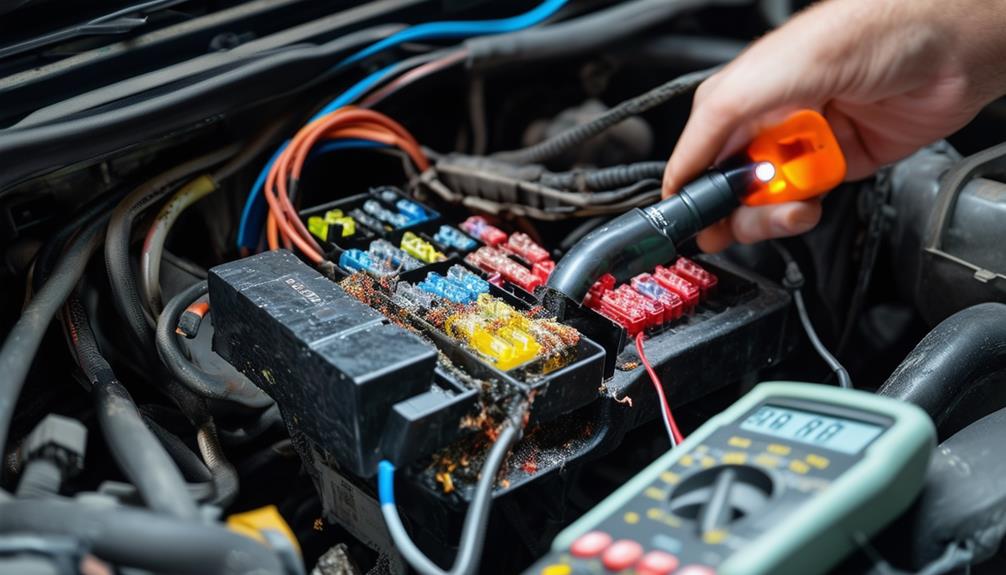
Electrical issues in the Nissan Frontier often arise from wiring and fuse problems, which can greatly impact your vehicle's performance. These problems can manifest in various ways, causing everything from minor inconveniences to significant malfunctions. Understanding the intricacies of your Frontier's electrical system is essential for maintaining peak functionality. Regular maintenance and prompt attention to potential issues can prevent many problems before they escalate.
Wiring issues are notorious for causing power surges and short circuits. Power surges can occur when there's a sudden spike in electrical current, potentially damaging sensitive components. Short circuits, on the other hand, happen when electrical flow diverts from its intended path, which can lead to blown fuses or even fire hazards. To help you navigate these complexities, here are some key aspects worth noting:
- Fuse Box Inspection: Regularly check the fuse box for any blown fuses, corrosion, or loose connections. A faulty fuse can disrupt multiple systems in your vehicle.
- Wiring Integrity: Inspect the wiring for any signs of wear, fraying, or damage. Damaged wiring can lead to inconsistent electrical flow, resulting in erratic behavior of vehicle electronics.
- Voltage Regulation: Verify that the voltage regulator is functioning correctly. Incorrect voltage levels can cause power surges, which may damage your vehicle's electrical components.
Keeping an eye on these elements not only aids in diagnosing existing problems but also in preventing potential issues. Advanced diagnostic tools can be particularly useful for identifying and rectifying wiring and fuse problems quickly and efficiently. By staying proactive, you can ensure that your Nissan Frontier remains dependable and performs at its best, incorporating innovative solutions to tackle even the most challenging electrical issues.
Dashboard Warning Lights Explained
Dashboard warning lights are essential indicators that alert you to potential issues within your Nissan Frontier's systems. Understanding these lights can save you time and possibly prevent more serious problems. Each light corresponds to specific components or systems, and knowing their meanings is crucial.
First, the check engine light is one of the most common warning lights. This light signifies issues ranging from a loose gas cap to more severe engine problems. Using diagnostic tools like an OBD-II scanner can help pinpoint the exact issue by reading fault codes. According to crash test results, understanding and addressing dashboard warning lights can greatly enhance overall vehicle safety.
Another key light is the battery charge warning. When this light appears, it suggests that there's an issue with your charging system, possibly the alternator, battery, or related wiring. Diagnostic tools can measure the voltage and current to determine the health of these components.
The ABS warning light indicates a malfunction in the Anti-lock Braking System. This light should never be ignored, as it directly impacts your vehicle's safety. The meaning behind this warning light usually involves sensor issues or hydraulic malfunctions within the braking system. Diagnostic tools can read ABS-specific codes to identify the root cause.
Don't overlook the oil pressure warning light. This light warns of low oil pressure, which can lead to engine damage if not addressed promptly. The meaning behind this light often points to low oil levels or a failing oil pump.
Lastly, the tire pressure monitoring system (TPMS) light alerts you to low tire pressure. The meaning behind this light is straightforward but essential for maintaining optimal vehicle performance and safety.
Being proactive with these warning lights and utilizing appropriate diagnostic tools ensures your Nissan Frontier remains in top condition, fostering a safer and more dependable driving experience.
Troubleshooting Tips for Electrical Issues
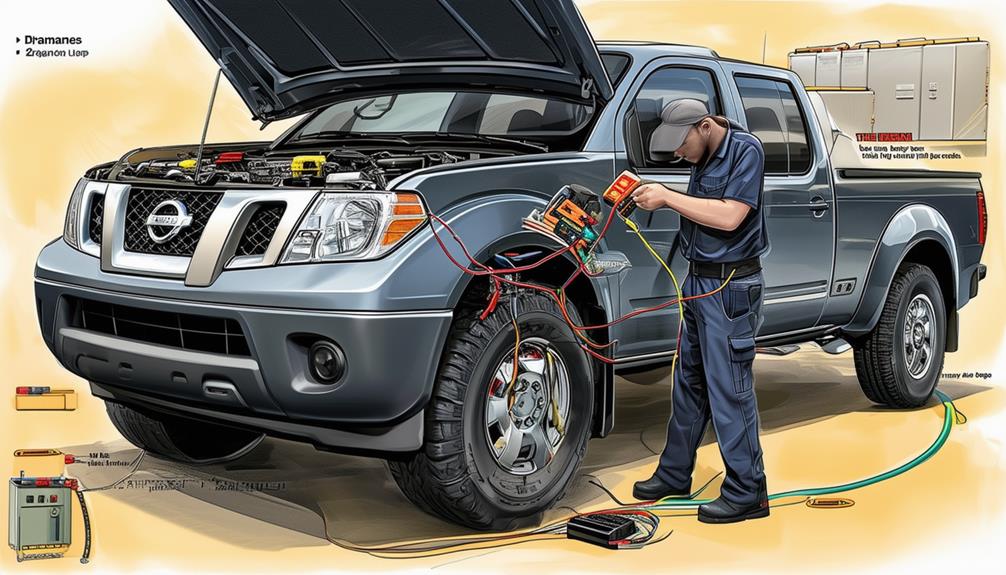
Understanding dashboard warning lights is just the start of maintaining your Nissan Frontier's electrical health. To keep your vehicle running smoothly, you need to move beyond the basics and delve into effective troubleshooting techniques for electrical issues. It's also beneficial to familiarize yourself with keyless entry systems, as they can sometimes be linked to broader electrical problems.
First, let's talk about voltage fluctuations. These can be indicators of deeper problems within your Nissan Frontier's electrical system. Use a multimeter to measure the voltage at the battery terminals while the engine is running. The reading should be between 13.7 to 14.7 volts. Anything outside this range could indicate an issue with the alternator or battery.
Next, consider grounding issues. Poor grounding can lead to a range of electrical problems, from dim headlights to erratic sensor readings. Verify that all ground connections are clean, tight, and free of corrosion. Pay special attention to the ground strap between the engine block and the chassis, as this is often neglected.
Here are some practical troubleshooting tips:
- Check Fuses and Relays: Inspect the fuse box for any blown fuses or faulty relays. Replace as necessary to restore proper function.
- Inspect Wiring Harnesses: Look for signs of wear, fraying, or damage in the wiring harnesses. Damaged wires can cause intermittent electrical issues and should be repaired or replaced promptly.
- Test Electrical Components: Utilize diagnostic tools to test components like the alternator, starter, and sensors. Faulty components can often be identified through specific error codes.
Repair Costs and Considerations
When it comes to repair costs for your Nissan Frontier's electrical issues, understanding what you're getting into before any work begins is essential. Precisely evaluating repair expenses and budgeting effectively can save you from unforeseen financial strain. Electrical issues vary widely, from simple fuse replacements to complex wiring problems, each with its unique cost implications. For specialized key replacements, consider consulting certified locksmiths who might offer competitive pricing and mobile services.
First, consider the diagnostic fee. Mechanics typically charge for the initial inspection, which can range from $50 to $150. This fee is vital for identifying the root cause of the problem.
Once diagnosed, minor issues like a blown fuse or a faulty relay might cost you between $10 and $50 for parts and labor. However, more intricate problems, such as alternator failures or wiring harness replacements, can escalate repair expenses to several hundred dollars.
For those inclined toward DIY solutions, it's important to recognize the risks involved. While replacing a fuse or relay might be straightforward with basic tools, more elaborate repairs demand advanced knowledge and equipment. Errors in DIY electrical repairs can lead to further damage, creating additional costs rather than savings. Furthermore, improper handling of electrical components can pose safety hazards.
To manage your repair costs effectively, always seek a detailed estimate from your mechanic. This should include parts, labor, and any additional fees. Additionally, inquire about warranties on both parts and workmanship to guarantee long-term reliability.
DIY Fixes vs. Professional Help

Deciding between DIY fixes and professional help for your Nissan Frontier's electrical issues hinges on several critical factors. Let's break down the considerations to help you make an informed decision.
First, assess your technical skill level. Electrical systems can be intricate, and missteps can lead to further damage. If you're confident in your ability to follow troubleshooting steps and have the necessary tools, DIY might be a viable option. However, if you lack experience, seeking professional advice could save you time and money in the long run. Additionally, enhancements to the ignition system can sometimes necessitate professional installation to ensure peak performance.
Second, consider the complexity of the issue. Simple problems like replacing a blown fuse or a faulty light bulb can typically be handled with basic tools and a good manual. More intricate issues, such as diagnosing a malfunctioning alternator or dealing with wiring problems, often require a deeper understanding of automotive electrical systems and specialized equipment.
Here are some factors to weigh:
- Cost: DIY can be budget-friendly, but the risk of error may lead to higher expenses later. Professional help usually comes with a guarantee.
- Time: Fixing an issue yourself can be time-consuming, especially without the right experience. Professionals can often diagnose and repair problems more efficiently.
- Safety: Electrical work can be risky. Professionals are trained to handle these hazards safely.
Preventive Maintenance Tips
Over time, regular preventive maintenance can keep your Nissan Frontier's electrical systems running smoothly and prevent costly repairs. By performing consistent electrical system checks and wiring maintenance, you can extend the life of your vehicle and maintain peak performance.
First, you'd want to conduct regular electrical system checks. This involves inspecting the battery, alternator, and starter. Confirm the battery terminals are clean and free from corrosion, as poor connections can lead to electrical failures. The alternator should be tested to verify it's charging the battery adequately. Finally, examine the starter for any wear and tear that might compromise its function.
Next, focus on wiring maintenance. Inspect all visible wiring for signs of fraying, corrosion, or damage. Broken or exposed wires can lead to shorts or even fires. Use electrical tape or heat shrink tubing to cover exposed wires and prevent moisture ingress. Additionally, periodically check the vehicle's ground connections, as a faulty ground can cause a myriad of electrical issues.
Here's a quick reference table to guide your preventive maintenance:
| Task | Frequency |
|---|---|
| Battery Inspection | Every 3 months |
| Alternator Testing | Every 6 months |
| Starter Examination | Annually |
| Wiring Inspection | Every 6 months |
Furthermore, consider upgrading to high-quality electrical components where possible. Innovative solutions such as advanced battery management systems can provide real-time monitoring, ensuring you're always aware of your electrical system's health.
Frequently Asked Questions
How Can I Improve the Lifespan of My Nissan Frontier's Electrical Components?
To improve your Nissan Frontier's electrical components lifespan, follow maintenance tips like regular battery checks, clean connections, and preventive measures such as avoiding excessive loads and using high-quality replacement parts. Stay proactive and innovative with your vehicle care.
What Are the Best Aftermarket Upgrades for Nissan Frontier Electrical Systems?
You should consider upgraded wiring and performance lighting for your Nissan Frontier. Focus on battery maintenance and grounding techniques to enhance reliability. These upgrades guarantee better electrical performance and longevity, catering to your desire for innovation.
How Often Should I Inspect My Nissan Frontier's Alternator?
Imagine being stranded due to a failed alternator. To prevent this, inspect your Nissan Frontier's alternator every 12 months. Regular alternator maintenance helps you catch signs of failure early, ensuring reliable performance and innovative driving experiences.
Are There Any Recalls Related to Nissan Frontier Electrical Issues?
You should check for recall information on your Nissan Frontier's electrical issues regularly. Implementing prevention methods guarantees peak performance. Stay updated via Nissan's official website or the NHTSA database for any new recalls.
What Specific Tools Are Needed for DIY Electrical Repairs on a Nissan Frontier?
For basic troubleshooting and proper maintenance on your Nissan Frontier, you'll need a multimeter, wire strippers, electrical tape, and a set of screwdrivers. These tools guarantee precise, effective repairs, promoting innovation in your DIY efforts.
Conclusion
In tackling Nissan Frontier electrical issues, understanding common problems like ignition failures, battery troubles, and wiring malfunctions is important. For instance, if you're dealing with a dead battery, checking the alternator's performance can save you from unnecessary replacements. While some fixes are DIY-friendly, others demand professional expertise. Regular preventive maintenance can greatly reduce these headaches. Always weigh repair costs and consider professional help for complex issues to keep your Nissan Frontier running smoothly.

